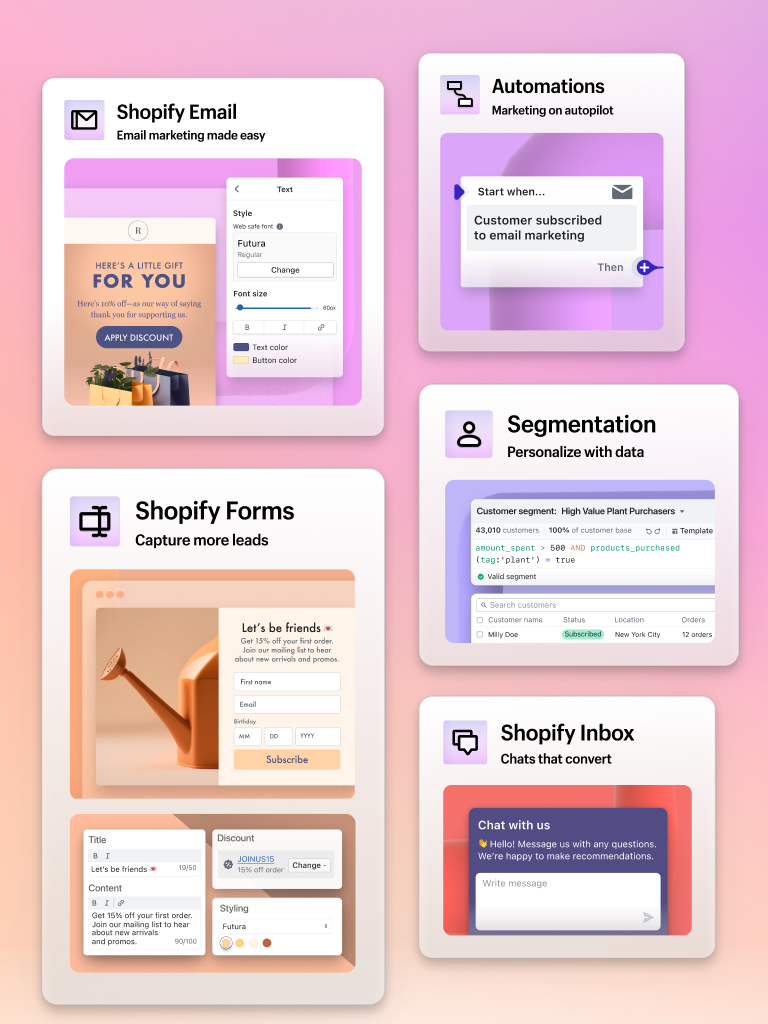
Introduction
In the digital age, building and managing an online presence is essential for businesses aiming to reach a wide audience. Shopify, a leading e-commerce platform, has established itself as a go-to solution for entrepreneurs and businesses seeking to create, grow, and manage their ventures online. Known for its robust features, ease of use, and versatility, Shopify is marketed as a complete commerce platform, allowing users to manage almost every aspect of their business from a single interface. This review explores Shopify’s core features, its advantages and limitations, and why it has become such a popular choice among online sellers.
Key Features of Shopify
Shopify’s reputation as a comprehensive e-commerce solution stems from its wide range of functionalities. Here’s a closer look at some of the platform’s standout features:
1. Online Store Creation and Customization
One of the first and most critical steps for any online business is establishing an attractive, user-friendly storefront. Shopify offers a powerful and intuitive interface for creating and customizing an online store. With a wide variety of professional templates and a drag-and-drop editor, Shopify makes it possible for users without coding knowledge to create visually appealing and functional websites.
Shopify’s design flexibility is further enhanced by the options for more advanced customization through HTML and CSS editing. This allows businesses to tailor their sites according to brand aesthetics or specific user needs. Additionally, Shopify’s App Store provides various plugins and integrations to extend site functionality, such as SEO optimizers, social media integration, and email marketing tools.
2. Multichannel Selling
In today’s digital marketplace, selling solely through an online store may limit a business’s reach. Shopify addresses this by supporting multichannel selling, allowing businesses to reach customers across a variety of platforms, including mobile, social media (such as Facebook and Instagram), online marketplaces (like Amazon and eBay), and even brick-and-mortar locations. This functionality enables businesses to establish a strong presence wherever their customers are and provides a seamless experience across channels.
Shopify POS (Point of Sale) is a crucial tool within this multichannel setup, enabling retailers to sync online and offline sales, manage inventory in real-time, and even accept payments in physical locations. Shopify’s POS system is highly customizable, allowing businesses to choose the POS equipment that suits their setup, whether it’s a retail store or a pop-up shop.
3. Product and Inventory Management
Effective product and inventory management is vital to the smooth operation of any e-commerce business. Shopify provides an extensive product management system that allows users to organize, display, and control their inventory with ease. Features like bulk product imports, product variations, and collections enable businesses to quickly set up their online catalog. Furthermore, Shopify automates inventory updates, so sellers can monitor stock levels in real time and avoid overselling or stockouts.
Additionally, Shopify’s inventory management integrates with multichannel sales, ensuring that product quantities are updated across all platforms. This streamlined approach reduces administrative workload and enhances accuracy, allowing business owners to focus on growth rather than operational details.
.

.
4. Secure Payment Processing
Payment processing can be a complex task for e-commerce businesses, especially when dealing with multiple currencies and payment methods. Shopify simplifies this process by providing its own payment gateway, Shopify Payments, which offers seamless integration and competitive transaction fees. Additionally, Shopify supports third-party payment providers like PayPal, Stripe, and Authorize.net, offering users flexibility in their choice of processor.
Shopify Payments allows customers to pay through various methods, including major credit cards, digital wallets, and buy-now-pay-later options like Affirm. Shopify Payments is also equipped with built-in fraud analysis tools, enhancing security and giving both the merchant and the customer peace of mind.
5. Shipping and Fulfillment Solutions
Logistics is another area where Shopify excels, offering features that facilitate the shipping and fulfillment process. Shopify provides integrated shipping solutions, including discounted shipping rates with major carriers, real-time shipping rates, and options for label printing directly from the platform. Additionally, Shopify’s integrations with third-party fulfillment centers enable businesses to delegate order fulfillment, so they can focus on other aspects of their business.
For businesses that need an international reach, Shopify simplifies the complexities of global shipping by allowing them to set up different shipping zones and rates. Advanced features, such as the Shopify Fulfillment Network, enable U.S.-based merchants to leverage Shopify’s warehouses and logistical services to optimize their fulfillment processes.
6. Cloud-Based and Mobile-Friendly
One of Shopify’s most attractive qualities is its cloud-based, fully hosted environment, which eliminates the need for business owners to worry about managing web servers or software updates. Since Shopify is entirely cloud-hosted, merchants can access their business and manage their operations from any device with an internet connection. This accessibility is especially beneficial for entrepreneurs who may need to monitor their store on the go.
Shopify’s mobile app extends the platform’s functionality to mobile devices, allowing users to view sales and analytics, manage orders, and communicate with customers from their smartphones. This flexibility makes Shopify a practical option for small business owners, digital nomads, and others who require a mobile-friendly e-commerce solution.
.

.
Pros of Using Shopify
The variety of features offered by Shopify provides numerous advantages for businesses of all sizes. Some of the key benefits include:
- Ease of Use: Shopify’s user-friendly interface and intuitive design make it accessible for beginners, while its extensive features cater to the needs of more experienced e-commerce professionals.
- Scalability: Shopify is a highly scalable platform, making it suitable for small startups as well as large enterprises. As businesses grow, they can upgrade their Shopify plan to access additional features and handle higher traffic volumes.
- Comprehensive Support and Resources: Shopify provides 24/7 customer support, along with extensive documentation, tutorials, and a vibrant community forum. This support network helps users troubleshoot issues and improve their e-commerce skills.
- Strong Security Features: With built-in SSL certification, regular updates, and fraud prevention tools, Shopify ensures that sensitive data is protected, meeting the security needs of businesses and their customers.
- Integrated App Marketplace: Shopify’s App Store allows businesses to customize their stores by adding features that enhance marketing, sales, customer engagement, and analytics. This ecosystem of third-party apps and integrations allows for extensive customization and automation.
- SEO-Friendly: Shopify provides numerous SEO tools and options for optimizing websites, making it easier for businesses to rank on search engines. SEO-friendly features include customizable title tags, meta descriptions, and URL structures.
Cons of Using Shopify
While Shopify is a robust platform, it is not without limitations. Some of the drawbacks include:
- Transaction Fees: If businesses choose to use a third-party payment processor instead of Shopify Payments, they may incur additional transaction fees. This can be a deterrent for businesses looking to minimize expenses.
- Limited Customization for Lower Plans: While Shopify’s customization options are extensive, advanced customization requires access to Shopify’s higher-tier plans or the use of third-party plugins, which may come at an additional cost.
- Content Limitations: For businesses that rely heavily on content marketing, Shopify’s blogging and content management features are somewhat limited compared to dedicated content management systems like WordPress.
- Pricing: Shopify’s pricing structure may not be ideal for every business. While it provides value for its price, small businesses or those with tight budgets may find it challenging to afford Shopify’s monthly fees along with the added costs of third-party apps and premium themes.
- App Dependency: Although Shopify’s app ecosystem is a great asset, many features require third-party apps to achieve specific functionalities. Relying on too many apps can lead to increased costs and potentially impact the store’s performance.
Shopify Pricing Plans
Shopify offers several pricing tiers to accommodate businesses of varying sizes and needs:
- Shopify Lite: This plan is ideal for businesses that want to sell on social media or existing websites but do not require a full online store.
- Basic Shopify: Suitable for new businesses, this plan provides essential e-commerce features, including a full online store and two staff accounts.
- Shopify: The mid-tier plan includes additional features, such as gift card functionality and detailed reporting, making it ideal for growing businesses.
- Advanced Shopify: This plan is best suited for larger businesses with high sales volume, offering advanced reporting tools and more comprehensive shipping options.
- Shopify Plus: The enterprise-level plan is designed for high-volume merchants, offering custom solutions, API support, and advanced features tailored to complex business requirements.
Each plan includes varying transaction fees and additional perks, allowing businesses to choose the option that best fits their budget and needs.
Conclusion: Is Shopify Right for Your Business?
In summary, Shopify’s versatility, scalability, and robust features make it a strong choice for businesses looking to establish or grow an online presence. Its ease of use and comprehensive support make it accessible to users of all skill levels, while its advanced features and multichannel capabilities cater to more established businesses aiming to expand their reach. Shopify’s cloud-based nature and mobile accessibility are particularly beneficial for business owners who value flexibility and remote management.
However, potential users should carefully consider Shopify’s pricing structure and the need for third-party apps. While Shopify provides a wide range of tools, some businesses may find the costs of using additional apps or premium features to be a disadvantage.
Ultimately, Shopify’s strengths far outweigh its limitations, making it an attractive option for entrepreneurs, small businesses, and even large enterprises. Whether you are a budding entrepreneur with a vision or an established retailer looking to expand your digital footprint, Shopify has the tools and support to help you succeed.
Find out more about Shopify by clicking this link.
If you found this useful please share it with friends and family, and why not check out our review of Namecheap which is one of the best domain registrars out there.
.
